
How often do you hear one of these statements?
“I need to get approval to do (or say) that.”
“I need to clear this through compliance.”
“You can’t quote me if I don’t get permission.”
“I can’t help you without approval.”
Have you ever considered the relationship, within an organization, between approval and trust?
I’m not referring to the first definition of “approval” from Merriam-Webster, but rather the second shown below.
1. The belief that something or someone is good or acceptable: a good opinion of someone or something
2. Permission to do something: acceptance of an idea, action, plan, etc.
Think about how many employees are constrained by an “approval process,” and how this impacts speed of innovation and decision-making as well as employee engagement. Think about how costly this is. Every time someone needs approval to say something or do something, the “approval” process impedes the outcome. In fact, the process may be so daunting, that employees choose to take the “easy” road, never creating anything new or suggesting a new idea. After all, it would require approval.
What if leaders chose to extend trust throughout the organization by never requiring approval for ANYTHING?
Instead CEOs and their Boards took the time to craft long-term credos, vision and values statements and/or Codes of Conduct; and they were more than just “slogans” etched into the wall at corporate headquarters. The entire staff, starting with the CEO, lived the values every day, and employees understood, at the time of hiring, that any “values violation” would result in immediate termination. Now imagine the innovation, speed of decision-making and empowerment that would come from this cultural transformation. Imagine the cost savings.
During the editing process of our new book Trust Inc. I spent time searching the websites of several large public companies. The goal was to include an Appendix of examples of well-crafted values statements. I was surprised at how difficult they were to find online, and when I did, most of them were “just talk” or empty words. The few I did locate could not be included as written without “approval” from the respective company’s legal department. This would have delayed the publication of the book by several months (not days.) I did a “work around” of the approval process, eliminating the company name.
If organizations spent more time building values instead of layers of legal teams and compliance departments, the word “approval” would start to look more like Merriam-Webster’s first definition: The belief that something or someone is good or acceptable: a good opinion of someone or something.
The word “approval” would start to look more like trust.
What do you think? Please feel free to leave a comment or send me a note at barbara@trustacrossamerica.com





Recent Comments